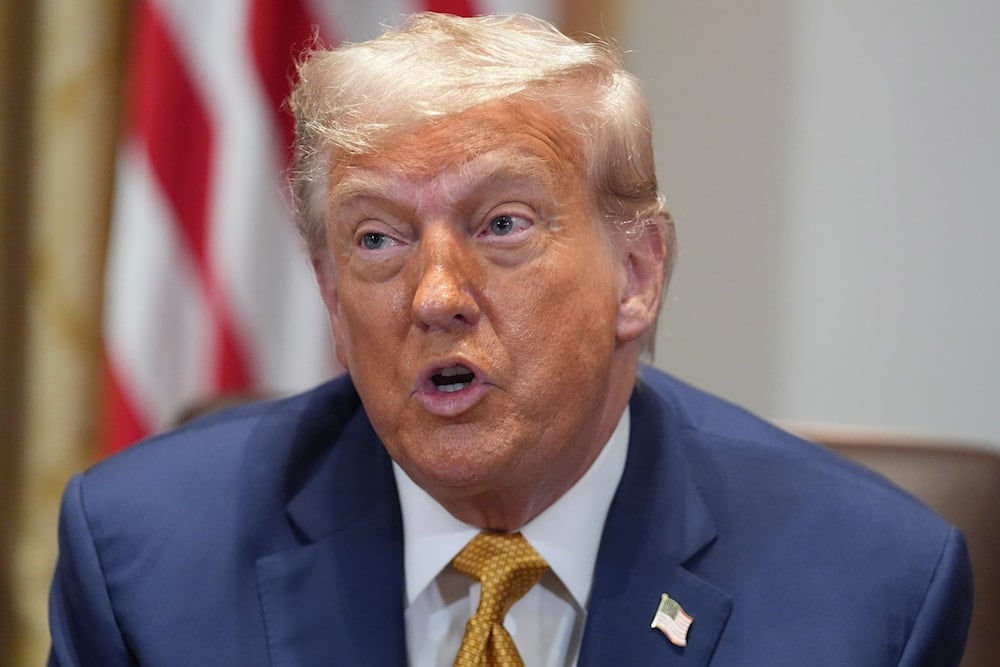Trump imposes 35% tariff on Canada effective August 1
US President Donald Trump cites Ottawa's retaliation and Canada's role in the fentanyl crisis as a reason for the tariffs.
-

US President Donald Trump speaks during a cabinet meeting at the White House, Tuesday, July 8, 2025, in Washington. (AP)
US President Donald Trump revealed on Thursday that his administration plans to implement a 35% tariff on Canadian imports, set to take effect beginning August 1.
"It is a Great Honor for me to send you this letter in that it demonstrates the strengths and commitments of our Trading Relationship, and the fact that the United States of America has agreed to continue working with Canada, despite Canada having financially retaliated against the United States," Trump said in a post on his social media platform Truth Social.
"As you will recall, the United States imposed Tariffs on Canada to deal with our Nation's Fentanyl crisis, which is caused, in part, by Canada's failure to stop the drugs from pouring into our country," he stated in a letter addressed to Canada's new Prime Minister, Mark Carney.
President Trump emphasized that instead of collaborating with Washington, Ottawa chose to retaliate with its own tariffs, clarifying that the newly announced 35% levy by the US would be distinct from any existing sector-specific tariffs. He additionally warned that any goods rerouted to circumvent the higher duties would face additional penalties.
Make a deal or deal with tariffs
Trump stated that Canada or Canadian-based companies would be exempt from tariffs if they opted to produce or manufacture their goods in the US, while assuring that all necessary approvals would be processed "quickly, professionally, and routinely — In other words, in a matter of weeks."
"If Canada decides to impose more tariffs, whatever rate it sets will be added on top of the 35% that we charge," the letter emphasized.
Trump pointed out that while the fentanyl crisis remains a significant concern, it is not the only trade issue with Canada, emphasizing that Canada's extensive tariff and non-tariff barriers continue to drive unsustainable trade imbalances with the US.
Trump expands his tariffs
Previously, US President Trump announced on July 7 that his administration is expanding the reach of his tariffs, sending formal letters to over a dozen countries cautioning them of significant penalties unless bilateral trade agreements are reached before August 1.
In letters published on Trump's Truth Social account Monday night, which reiterated his administration's pursuit of what he terms "balanced" and "fair" trade, each message detailed country-specific tariffs set to take effect next month while leaving room for potential negotiations should foreign leaders be prepared to offer concessions.
The July 7 round of tariffs targets several nations, with Bangladesh potentially facing a 35% duty on its garment exports, Cambodia confronting a reduced 36% rate compared to April's proposed 49%.
Serbia, Tunisia, and Kazakhstan each grapples with proposed tariffs between 25% and 35%, Malaysia's critical electronics sector braces for 25% duties, and South Africa, already burdened by 30% tariffs, faces a possible additional 10% surcharge due to its BRICS affiliation.
"Our relationship has been, unfortunately, far from Reciprocal," Trump's letter, shared to multiple countries, read. "We invite you to participate in the extraordinary Economy of the United States," he said, adding, "but only with more balanced, and fair, TRADE."
On July 9, US President Donald Trump revealed plans to implement new tariffs ranging from 20% to 30% on imports from seven nations, with the measures scheduled to begin on August 1.
Trump shared letters on Truth Social outlining the new tariff structure, revealing that the Philippines will face 20% tariffs, Brunei and Moldova will be subject to 25% duties, while Sri Lanka, Iraq, Algeria, and Libya will see steeper 30% rates.
US tariffs have hawk eyes on BRICS alliance
On July 6, US President Donald Trump declared that countries choosing to align themselves with what he described as "the anti-American policies of BRICS" would be subject to "an ADDITIONAL 10% Tariff," making clear that this policy would apply without exception.
Trump did not provide further details, but his comments came after the 11-member BRICS bloc, which includes Brazil, Russia, India, and China, released a statement expressing deep concern about the growing use of unilateral trade restrictions.

 4 Min Read
4 Min Read










